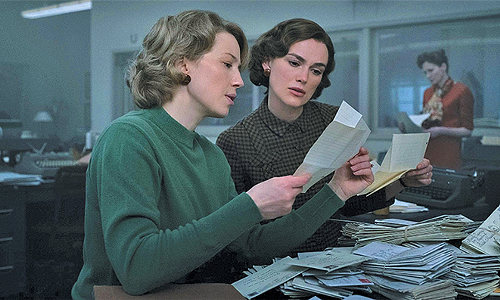Boston Strangler feature movie review
Unlike Zodiac, this tale of real-life serial killings can't find a compelling focus.
By Scott Renshaw @scottrenshawWhen you've seen more than 10,000 movies, the urge to make connections is strong, even when you can feel that the connections aren't always neat and tidy. That feeling tickled the back of my brain for nearly the entirety of Boston Strangler, as I watched a fact-based 1960s period piece about an infamous string of serial murders, a journalist who gets caught up in the story and a lingering uncertainty about the identity of the killer—and kept wondering why this movie couldn't be more like Zodiac.
Now, David Fincher's 2007 thriller about the search for the San Francisco Bay area's "Zodiac killer" had a specific thematic goal in mind, diving into the professional and amateur investigators who became obsessed with the idea that this puzzle must be solvable. That's not the framework for Boston Strangler at all, as writer/director Matt Ruskin (Crown Heights) uses this real-life story to take on several different ideas at the same time. And unfortunately, the inability to settle on any one of those ideas is part of what makes it so frustrating.
The focal point here is Loretta McLaughlin (Keira Knightley), a journalist for the Boston Record American circa 1962 who—by virtue of being a woman journalist in that particular time and place—is consigned to the "lifestyle" section despite wanting to dig into hard news stories. When elderly Boston-area women begin turning up dead, Loretta is the first to see a possible connection, and get confirmation that there are common elements at the crime scenes, like stockings tied in a bow around the victims' necks. As she begins covering the mysterious killer she dubs the "Boston Strangler" with fellow reporter Jean Cole (Carrie Coon), Loretta begins provoking the ire of the local police, who start taking stories about their ineffectual investigations personally.
Not surprisingly, much of Boston Strangler deals with institutional sexism, in ways that are aggravating as often as they are instructive. It's a potentially welcome twist when we initially see that Loretta's husband (Morgan Spector) seems unfailingly supportive of her professional life, taking on a share of responsibility for caring for their children—until his own career offers the chance for advancement, and he becomes a predictable grousing-spouse character in a story of this kind. It's more effective when Ruskin's script focuses on how the police attempt to diminish and discredit Loretta's reporting simply because she's a woman, though that seems to clash with how easily she continues to be able to access crime scenes.
Still, it would have been something if Ruskin had at least been tightly focused on the idea of a woman's voice being silenced in pursuit of a killer silencing women's voices. Instead, Boston Strangler keeps getting sidetracked by other concerns.
Once the story breaks, and additional murders deviate from the pattern of the kind of victim targeted, there's the notion that media coverage might have spawned copycat killers—a potential for guilt or uneasiness in Loretta and Jean that we never see. There's also material about the potential for killers to capitalize financially on their crimes with books or other media opportunities, but that idea ultimately feels more like an asterisk than a real area for exploration.
None of that exactly sets Boston Strangler on a collision course for comparison with Zodiac, leaving aside that Knightley's jaw-forward determination isn't nearly as interesting or nuanced as the mania of Zodiac's Jake Gyllenhaal. But then we get a very familiar moment: Our protagonist paying a direct visit to one of the possible suspects, and beginning to sense from the environment a possibility of personal threat. Yes, it's different here that the protagonist in question is a woman rather than a man, as the corresponding scene was in Zodiac, and as such feeds into the particular dangers faced by a woman. It's also a far less unsettling scene, and one that seems built more for a quick jolt of suspense rather than exploring the unease of dabbling in realms of pure evil.
There is, of course, also the matter that both cases ultimately remain unsolved. In Boston Strangler, it's hard to square the emphasis on the reporters' personal achievement with the notion that they might not have made anyone any safer. Zodiac understood that some questions don't ever get answers—and that showing pictures at the end of our intrepid real-life heroes might be missing the point.
More by Scott Renshaw
-
Film Reviews: New Releases for April 19
The Ministry of Ungentlemanly Warfare, Abigail, The Beast, Hard Miles, Sasquatch Sunset and more
- Apr 19, 2024
-
Faces of Salt Lake County book and portrait reception
Images and personal stories in a new book reveal local demographic diversity
- Apr 17, 2024
-
Feature film review: THE BEAST
A filmmaker's compelling ideas get a bit tangled in references to his creative influences.
- Apr 17, 2024
- More »




